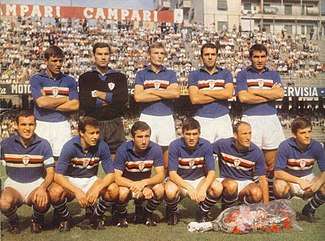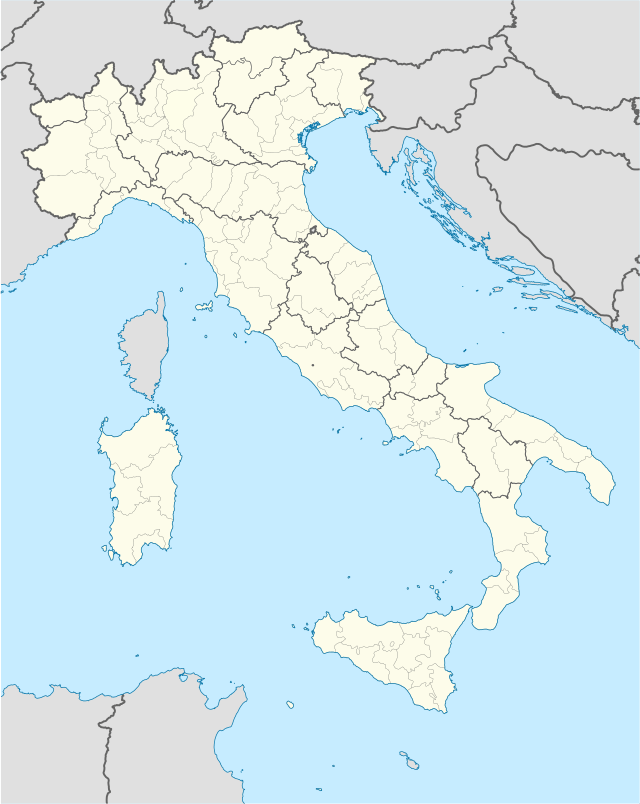1966–67 Serie B
The Serie B 1966–67 was the thirty-fifth tournament of this competition played in Italy since its creation.
| Season | 1966–67 |
|---|---|
| Champions | Sampdoria 2nd title |
← 1965–66 1967–68 → | |
Teams

1966–67 Sampdoria team
Savona, Arezzo and Salernitana had been promoted from Serie C, while Sampdoria, Catania and Varese had been relegated from Serie A.
The Genoa’s “derby” was played in Serie B for the first time.
Events
Transitional promotions and relegations were imposed by the reduction of the Serie A.
Final classification
| Pos | Team | Pld | W | D | L | GF | GA | GR | Pts | Promotion or relegation |
|---|---|---|---|---|---|---|---|---|---|---|
| 1 | Sampdoria (P, C) | 38 | 20 | 14 | 4 | 47 | 19 | 2.474 | 54 | 1967–68 Serie A |
| 2 | Varese (P) | 38 | 19 | 13 | 6 | 44 | 21 | 2.095 | 51 | |
| 3 | Catanzaro | 38 | 14 | 14 | 10 | 44 | 42 | 1.048 | 42 | |
| 3 | Catania | 38 | 15 | 12 | 11 | 35 | 31 | 1.129 | 42 | |
| 3 | Reggiana | 38 | 15 | 12 | 11 | 35 | 39 | 0.897 | 42 | |
| 6 | Padova | 38 | 11 | 17 | 10 | 37 | 33 | 1.121 | 39 | |
| 6 | Modena | 38 | 12 | 15 | 11 | 41 | 44 | 0.932 | 39 | |
| 6 | Potenza | 38 | 13 | 13 | 12 | 35 | 38 | 0.921 | 39 | |
| 9 | Palermo | 38 | 12 | 14 | 12 | 34 | 26 | 1.308 | 38 | |
| 9 | Reggina | 38 | 11 | 16 | 11 | 35 | 33 | 1.061 | 38 | |
| 11 | Messina | 38 | 11 | 15 | 12 | 36 | 40 | 0.900 | 37 | |
| 12 | Genoa | 38 | 12 | 12 | 14 | 39 | 33 | 1.182 | 36 | |
| 12 | Verona | 38 | 12 | 12 | 14 | 33 | 36 | 0.917 | 36 | |
| 12 | Pisa | 38 | 10 | 16 | 12 | 27 | 30 | 0.900 | 36 | |
| 12 | Novara | 38 | 13 | 10 | 15 | 31 | 35 | 0.886 | 36 | |
| 16 | Livorno | 38 | 12 | 11 | 15 | 32 | 39 | 0.821 | 35 | |
| 17 | Savona (R) | 38 | 12 | 10 | 16 | 44 | 46 | 0.957 | 34 | 1967–68 Serie C |
| 18 | Arezzo (R) | 38 | 11 | 10 | 17 | 39 | 44 | 0.886 | 32 | |
| 19 | Alessandria (R) | 38 | 8 | 13 | 17 | 35 | 48 | 0.729 | 29 | |
| 20 | Salernitana (R) | 38 | 9 | 7 | 22 | 23 | 49 | 0.469 | 25 |
Source: Panini
(C) Champion; (P) Promoted; (R) Relegated.
(C) Champion; (P) Promoted; (R) Relegated.
Results
References and sources
- Almanacco Illustrato del Calcio - La Storia 1898-2004, Panini Edizioni, Modena, September 2005
gollark: Perhaps it has some sort of connection tracking limit.
gollark: Not unsafe in the sense that it'll do undefined behaviour probably, just that you can't statically be sure it only contains the type you want.
gollark: It's a wildly unsafe and slow "generic", and you can write fast code with generics. More so than if you have to unsafely typecast any time you want a data structure other than the 3 built-in ones.
gollark: (I know they seem to be working on them now, but it's after years of denying they were necessary or good)
gollark: Go as in golang? In which case, mandatory lol no generics.
This article is issued from Wikipedia. The text is licensed under Creative Commons - Attribution - Sharealike. Additional terms may apply for the media files.
